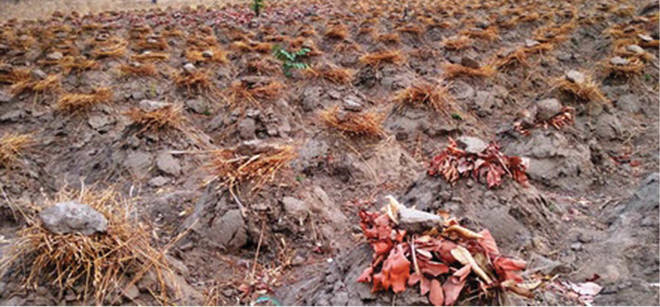Yam farmers threatened by seedling cost, export law
Yam farmers in the country have continued to express concern over three issues, which according to them, severely affect the nation’s yam economy. Chairman of the Yam Farmers Association of Nigeria and the chairman, Technical Committee on Nigeria Yam Export Programme, Professor Simon Irtwange, Tuesday told this reporter that yam farmers need about 9.1 million […]


Yam farmers in the country have continued to express concern over three issues, which according to them, severely affect the nation’s yam economy.
Chairman of the Yam Farmers Association of Nigeria and the chairman, Technical Committee on Nigeria Yam Export Programme, Professor Simon Irtwange, Tuesday told this reporter that yam farmers need about 9.1 million seedlings to meet growing demand for local consumption and export this year.
Irtwange, a yam farmer who is also a Professor of Processing and Storage at the University of Agriculture Makurdi, stressed that there is inadequacy of varieties of yam seedlings to meet the farmers’ needs across the growing belts of the country.
This, he said, was threatening the farming of yam across the country.
Speaking on the 1989 Export Prohibition Act, the professor stressed that the law is inimical to the government agenda of treating agriculture as business rather than development initiative.
The Export (Prohibition) Act, of 16th February, 1989 prohibits absolutely, the exportation of yam tuber along with cassava tuber, maize, rice and beans.
Section 2, subsection 1 of the Act states: “Any person, who takes, causes to be taken, induces any other person to take or attempts to take out of Nigeria any of the goods specified in the schedule to this Act shall be guilty of an offence and liable on conviction to imprisonment for life.”
Subsection 3 also stated that “Any customs officer or other person who aids, counsels, procures, or conspires with any person to commit an offence under this section, shall be guilty of an offence and liable on conviction to the same punishment as prescribed for the offence under subsection (1) of this section.
“Any offence committed under this Act shall be triable by the Federal High Court.”
Irtwange stressed that this law needs to be repealed if the business of yam farmers and exporters will have legal backing.
Also speaking, Ms Heather Akanni, the Technical Assistant to the Minister of Agriculture and Rural Development, on Quality Control and Standardisation, said the ministry was working with the IITA to upscale different yam varieties specifically designed for export, stressing that some of the local varieties that grow too big might not be suitable for export.
On the Export Prohibition Act, Ms Akani stressed that the process of repealing the law was ongoing at the National Assembly, noting that the nation could not be talking about agriculture as business and at the same time have laws that prohibit export, which will bring more money to farmers.
Emmanuel Michael, a yam farmer whose farm is located in Nasarawa State said the cost of getting yam seedlings was quite high for the smallholder farmers.
According to him, he bought 700 seeds for N49,000 two weeks ago, but the cost went up to N64,000 because of transportation.
Some yam farmers who also spoke with this reporter in Agyaragu, a town known for yam farming located along Lafia-Makurdi road said many yam farmers were yet to recover from the farmers-herders crisis, which severely affected yam production in the region.
On researches, the International Institute for Tropical Agriculture said there is “ongoing research that includes improving protocols for rapid mass propagation using seed yam, mini sett technology, aeroponics, and temporary immersion bioreactors” that would advance yam cultivation in the country.
